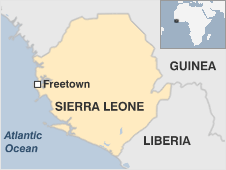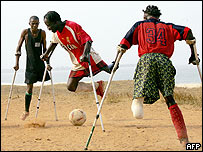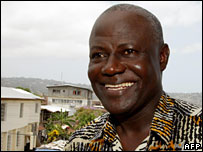 |
| Sierra Leone Drugs & Pharmaceutical Industry Pharmaceutical and Medicine Manufacturing in Sierra Leone Pharmaceutical Companies in Sierra Leone Suppliers Manufacturers Exporters & Importers pharmaceutical manufacturers in Sierra Leone Manufacturer Pharmaceuticals Suppliers in Africa pharmaceutical technology asia pacific Manufacturing Industry in Sierra Leone Pharmaceuticals Manufacturing in Africa pharmaceuticals company from Sierra Leone List of African Pharmaceutical Companies pharmaceutical distributors Sierra Leone Pharmaceuticals importer in Africa Pharmaceuticals Manufacturing Phamaceutical industries in Africa list of pharmaceutical companies in africa List of Pharmaceutical Companies in Sierra Leone Sierra Leone PHARMACEUTICAL Pharmaceutical Company Directory African Pharmaceutical Industry Sierra Leone Pharmaceuticals & Healthcare Report Sierra Leone Companies |
More than 17,000 foreign troops disarmed
tens of thousands of rebels and militia
fighters. Several years on, the country
still faces the challenge of reconstruction.
Overview
A lasting feature of the war, in which tens of thousands died, was the atrocities committed by the rebels, whose trademark was to hack off the hands or feet of their victims.
|
|
AT-A-GLANCE

Politics: Sierra Leone is
recovering from a 10-year civil war which
ended in 2002; war centred around a power
struggle and had a regional dimension
Economics: Substantial growth in
recent years, but Sierra Leone remains
bottom of UN's league for human
development
|
A UN-backed war crimes court has been set up to try those, from both sides, who bear the greatest responsibility for the brutalities.
Sierra Leone has experienced substantial economic growth in recent years, although poverty and unemployment remain major challenges.
In June 2009, the UN said that despite some impressive gains in rebuilding since the end of the civil war, efforts to consolidate peace and prosperity in the country remained fragile.
Economic recovery has been slow partly because the reconstruction needs are so great. Around half of government revenue comes from donors.
The restoration of peace was expected to aid the the country's promotion as a tourist destination in the long term. Sierra Leone boasts miles of unspoilt beaches along its Atlantic coast, and hopes to emulate its neighbour Gambia in attracting tourists.
Sierra Leone is also rich in diamonds and other minerals. The trade in illicit gems, known as "blood diamonds" for their role in funding conflicts, perpetuated the civil war. The government has attempted to crack down on cross-border diamond trafficking.
Sierra Leone has a special significance in the history of the transatlantic slave trade. It was the departure point for thousands of west African captives. The capital, Freetown, was founded as a home for repatriated former slaves in 1787.
Facts
- Full name: Republic of Sierra Leone
- Population: 5.7 million (UN, 2009)
- Capital: Freetown
- Area: 71,740 sq km (27,699 sq miles)
- Major languages: English, Krio (Creole language derived from English) and a range of African languages
- Major religions: Islam, Christianity
- Life expectancy: 46 years (men), 49 years (women) (UN)
- Monetary unit: Leone
- Main exports: Diamonds, rutile, cocoa, coffee, fish
- GNI per capita: US $320 (World Bank, 2008)
- Internet domain: .sl
- International dialling code: +232
Leaders
President : Ernest Bai Koroma
Ernest Bai Koroma was sworn in as Sierra Leone's new president on 17 September 2007. He won 54.6% of the vote in a run-off with the incumbent vice-president Solomon Berewa.

President
Koroma has pledged to fight corruption
|
Mr Koroma promised zero tolerance on corruption in his inaugural speech. He also said he'd fight against the mismanagement of state resources.
Addressing thousands of cheering supporters, Mr Koroma said: "We know how high your expectations are and that you have suffered for too long."
Mr Koroma's All People's Congress (APC) also won a majority in parliamentary elections held in August 2007.
He was born in northern Makeni in 1953, and is an insurance broker who says he wants to run Sierra Leone like a business concern.
His predecessor Ahmad Tejan Kabbah is credited with bringing in foreign help to rescue the country. Mr Kabbah stepped down in August 2007 after serving two terms in office.
Media
Media freedom in Sierra Leone has its limits; media rights monitors say high-level corruption is a taboo topic, with officials using libel laws to target errant journalists.
Challenges facing broadcasters include unreliable power supplies, poor funding and low advertising revenues.
There are dozens of radio stations, most of them privately owned. The UN Mission in Sierra Leone, Unmasil, operates radio services. They carry information about human rights and UN activities, as well as music and news.
BBC World Service can be heard on FM in Freetown (94.3), Bo (94.5) and Kenema (95.3). Voice of America and Radio France Internationale broadcast on FM in Freetown.
Dozens of newspapers are published in Freetown, despite low literacy levels. Most of them are privately-run and are often critical of the government. .
The press
- Awoko
- Concord Times
- Standard Times
- Independent Observer
- For di People
Television
- Sierra Leone Broadcasting Service (SLBS) - terrestrial network with limited coverage
- ABC TV - private
Radio
- Sierra Leone Broadcasting Service (SLBS) - national broadcaster
- Radio Democracy 98.1 FM - Freetown station, once the voice of the exiled Kabbah government, regarded as pro-government
- Kiss FM - private station in Bo
- SKYY FM - private station in Freetown
- Radio Unamsil - UN radio network
- Capital Radio - private station in Freetown
- Believers Broadcasting Network - Freetown, Christian FM station
- Voice of the Handicapped - founded as an FM station for disabled citizens, but attracts a wider audience
News agency
-
Sierra Leone News Agency
AFRICA | ASIA-PACIFIC | AMERICAS | EUROPE | MIDDLEEAST | SOUTHASIA
Mauritania Mauritius Morocco Mozambique Namibia Niger Nigeria Republic-of-congo Rwanda Sao-tome-and-principe Senegal Seychelles Sierra-leone Somalia South-africa Sudan Swaziland Tanzania The-gambia Togo Tunisia Uganda zambia Zimbabwe Australia Brunei Burma Cambodia China East-timor Fiji Indonesia Japan Kazakhstan Kiribati Kyrgyzstan Laos Malaysia Marshall-islands Micronesia Mongolia Nauru New-zealand North-korea Palau Papua-new-guinea Samoa Singapore Solomon-islands South-korea Taiwan Tajikistan Thailand The-philippines Tonga Turkmenistan Tuvalu Uzbekistan Vanuatu Vietnam Antigua-and-barbuda Argentina Bahamas Barbados Belize Bolivia Brazil Canada Chile Colombia Costa-rica Cuba Dominica Dominican-republic Ecuador El-salvador Grenada Guatemala GuyanaHaiti Honduras Jamaica Mexico Nicaragua Panama Paraguay Peru St-kitts-and-nevis St-lucia St-vincent-and-the-grenadines Suriname Trinidad-and-tobago United-states-of-america Uruguay Venezuela Albania Andorra Armenia Austria Azerbaijan Belarus Belgium Bosnia-hercegovina Bulgaria Croatia Cyprus Czech-republic Denmark Estonia Finland France Georgia Germany Greece Hungary Iceland Ireland Italy Latvia Liechtenstein Lithuania Luxembourg Macedonia Malta Moldova Monaco Montenegro Norway Poland Portugal Russia San-marino Serbia Slovakia Slovenia Spain Sweden Switzerland The-netherlands Turkey Ukraine United-kingdom Vatican Algeria Egypt Iran Iraq Israel-and-palestinian-territories Jordan Kuwait Lebanon Libya Mauritania Oman Saudi-arabia Sudan Syria Tunisia United-arab-emirates Yemen Afghanistan Bangladesh Bhutan India Nepal Pakistan Sri-Lanka The-Maldives

